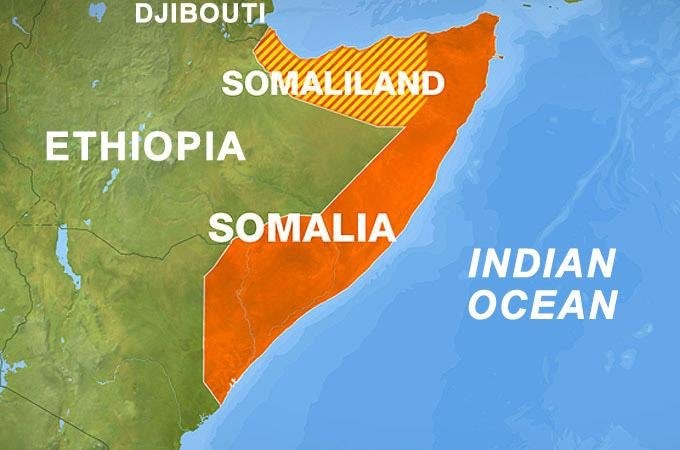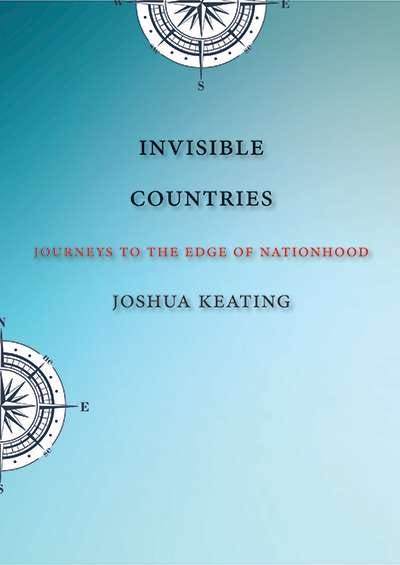The Somali people, insomuch as a collection of warring tribal factions can exist as one people, have two sovereign states. The first is the internationally recognized Somalia—a wasteland of conflict, starvation, poverty, and violent militant crime that even the most generous NGO worker will rarely visit. Then there is the unrecognized but entirely self-governing Somaliland. This unrecognized country in the very North of the Horn of Africa has long been striving for international recognition.
And who can blame them? Somaliland streets are clean, it’s economy is growing, and the country has experienced decades of stable democratic handovers between rival political parties.
Somalia, by contrast, requires the presence of a constant mission of foreign troops in order to remain stable in its capital. The hinterland of the country is run by tribal militants who would sooner kill an aid worker than accept their help. One would think that the liberal governments of the West could take a hint, but alas they remain steadfast in their desire to stabilize a country that has proven nothing and remains a base for piracy and militancy.
Meanwhile, Somaliland has functioned as a de facto independent entity since it declared independence from Somalia in 1991; yet it has not received formal recognition from any UN member state, including Western nations.
This is an incredible development when one considers that Somaliland features a GDP per capita twice that of Somalia and Western companies such as Coca-Cola and Pizza Hut feel safer establishing their regional production and distribution centers in this unrecognized state rather than any of the neighboring sovereign countries.
However, the world is very different now than it was in 1991, and Western publics are increasingly interested in those issues that serve their national interests rather than continuing policies that vaguely nod to neoliberal dogmas about “aid and democracy.” Despite assurances from progressive-liberal leaders that migration flows would eventually cease as endless foreign aid flows to Africa, the Middle East, and beyond, we now know this has been a lie. The result is that Western governments now spend billions domestically to care for recent immigrants and their descendants in addition to sending billions abroad.
With this in mind, recognizing Somaliland in The West would serve not only as a novel policy approach to replace the failing paradigm, but could be a mutually beneficial arrangement. Specifically, Somaliland should be recognized in exchange for the Remigration of the Somali diaspora. The West could offer Somaliland diplomatic recognition, access to international institutions, access to financing and a plethora of other arrangements that would facilitate the further development of the nascent nation-state.
The Somali Diaspora
The Somali diaspora is one of the largest and most geographically dispersed in the post-war world, with millions of Somalis being dumped into once homogeneous communities in the United States (1.22 million), Canada (362,000), the United Kingdom (876,000), Sweden (270,000), and Germany (328,000). Most left Somalia due to the civil war that erupted in the late 1980s, as well as ongoing instability and poverty in the country. As is typical of self-hating liberal Western governments, these refugee flows have led to chain migration that continues to this day. Entire Somali villages have relocated to the United States—a fact admitted by the United States State Department as early as 2008. Today, Somalis in that country submit bills in the Minnesota legislature to give themselves millions of dollars in tax money (that is, when they are not committing fraud with tax money they have already received). This growing concentration of Somalis are just 1.5% of the state’s population but use 28% of all childcare and child assistance funding in Minnesota.
Meanwhile, Somalis in Sweden and the United Kingdom defraud native taxpayers in the tens of millions every year while collecting legitimate welfare benefits in the tens of billions. In one case, a particularly enterprising Somali woman was able to defraud both the Swedish and British governments before being caught decades into her ruse.
As a result of generous Western welfare states and policies that enable chain migration, entire villages of Somalis have relocated to the Western world. Still, this state of affairs could be leveraged in negotiations to repatriate Somalis to Somaliland in exchange for formal recognition. After decades in the West, these Somalis are much better educated than their counterparts in the homeland. They also have access to significant financial resources, with many sending remittances back home to support their families.
Recognition for Remigration
If Western nations were to officially recognize Somaliland as an independent state, this must be paired with agreements to deport criminals, illegal aliens, failed asylum seekers, and most crucially, open the door to those millions of Somalis who would voluntarily return home with proper incentives (see Sweden’s example).
The structure of recognition will be crucial:
Political Stability and Security: Western recognition would help solidify Somaliland’s viability and further stabilize its institutions. The Somaliland state would gain access to crucial technologies, companies, and international regulatory bodies that can bolster an already functional democracy.
This integration into institutions would also enable the easy transfer of money and assets from the returning diaspora to their homeland as well as enable Western governments to facilitate Remigration.Access to International Aid and Investment: Recognition would unlock opportunities for Somaliland to access foreign aid and investment from Western countries, international organizations, and global institutions like the World Bank. This could fuel the economic development of Somaliland, creating jobs, infrastructure, and social services—factors that would make it easier for returning members of the diaspora to reintegrate and contribute to their homeland’s growth.
Economic Opportunities: The Somali diaspora represents a highly skilled and entrepreneurial population compared to their domestic brethren. By recognizing Somaliland, the West would encourage diaspora members to invest in various sectors, including technology, education, healthcare, and infrastructure development. The return of these skilled professionals would help in providing a robust backbone of essential services that mirror the quality of those in the West.
The Cornerstone of Remigration: All of the agreements, memoranda of understanding, and recognition of Somaliland should center around the theme of Remigration. If Somaliland wants endorsement to join the United Nations, it must agree to take back its nearly 300,000 brothers and sisters residing in Sweden. If the United Kingdom were to supply Somaliland with recognition and backing to enter financial markets, the nascent state must agree to the steady, structured, Remigration of the 876,000 Somalis in the United Kingdom.
Geopolitics
In addition to the direct benefits for Somaliland and the Somali diaspora, the recognition of Somaliland would have broader implications for regional stability and geopolitics. The Horn of Africa is a strategically important region, with major global powers showing growing interest due to its proximity to the Red Sea and the Gulf of Aden, both vital trade routes. Europe’s trade flows through the Gulf of Aden, and with states such as China and Ethiopia gaining a foothold in Djibouti it will be crucial for Western governments to find an alternative place to base their troops, vessels, and interdiction capacities.
Recognizing Somaliland would create a stable, functioning democracy in contrast to Somalia’s political turmoil and the ethnic civil wars that keep erupting in other states such as Ethiopia, which remains riddled with instability and the ongoing threat of terrorism from groups like Al-Shabaab. By recognizing a stable, democratic Somaliland, the West can ensure an island of stability remains in the region and redirect Somali refugees to Somaliland in perpetuity. The huge Somali populations of Ethiopia or Kenya will have no excuse to flee to the West when they can move to a stable Somali state instead.
A Win-Win for the West and Somaliland
The recognition of Somaliland in exchange for the Remigration of the Somali diaspora offers a unique opportunity for both the West and Somaliland. Somaliland gains recognition, access to the international community, and a highly educated returning diaspora while the West begins to undue decades of demographic damage.
In this win-win scenario, the Somali diaspora in the West should not be punished or blamed for their presence in the West and our governments have an opportunity to peacefully rectify the situation by promoting the foundation of the one stable piece of native Somali soil that currently exists. Meanwhile, Western communities would raise their children in a stable, safe, and culturally-cohesive state.
Support our mission to take on more writers and contributors:
Zelle: whitepapersinstitute@protonmail.com
Buy us a coffee: https://www.buymeacoffee.com/wppi
Linktree: https://linktr.ee/wppi
Snail Mail: White Papers Policy, PO Box 192, Hancock, MD 21750S









Wonderful. I pray we can get this introduced into state and federal legislatures. Ilhan Omar has already stated that she will get Somalia and her people what they want. We should treat her statement as a treason and a threat of permanent colonization. Then turn and use that leverage to make an offer that she may not refuse.
This is a great article and an excellent and creative solution.